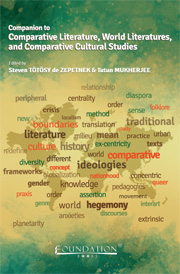Book contents
- Frontmatter
- Contents
- Introduction to the Companion to Comparative Literature, World Literatures, and Comparative Cultural Studies
- PART 1 Theories of Comparative Literature, World Literatures, and Comparative Cultural Studies
- PART 2 Comparative Literature in World Languages
- African Literatures as World Literatures
- Comparative Literature in Arabic
- Comparative Poetics in Chinese
- Comparative Literature in French
- Comparative Literature in German
- Comparative Literature in Iberian Spanish and Portuguese
- Comparative Literature in Indian Languages
- Comparative Literature in Italian
- Comparative Literature in Latin American Studies
- Comparative Literature in Russian and in Central and East Europe
- Comparative Literature in the United States
- PART 3 Examples of New Work in Comparative Literature, World Literatures, and Comparative Cultural Studies
- PART 4 Multilingual Bibliography of Books in Comparative Literature, World Literatures, and Comparative Cultural Studies
- Index
Comparative Literature in Indian Languages
from PART 2 - Comparative Literature in World Languages
Published online by Cambridge University Press: 05 April 2014
- Frontmatter
- Contents
- Introduction to the Companion to Comparative Literature, World Literatures, and Comparative Cultural Studies
- PART 1 Theories of Comparative Literature, World Literatures, and Comparative Cultural Studies
- PART 2 Comparative Literature in World Languages
- African Literatures as World Literatures
- Comparative Literature in Arabic
- Comparative Poetics in Chinese
- Comparative Literature in French
- Comparative Literature in German
- Comparative Literature in Iberian Spanish and Portuguese
- Comparative Literature in Indian Languages
- Comparative Literature in Italian
- Comparative Literature in Latin American Studies
- Comparative Literature in Russian and in Central and East Europe
- Comparative Literature in the United States
- PART 3 Examples of New Work in Comparative Literature, World Literatures, and Comparative Cultural Studies
- PART 4 Multilingual Bibliography of Books in Comparative Literature, World Literatures, and Comparative Cultural Studies
- Index
Summary
Abstract: In his article “Comparative Literature in Indian Languages” Anand Balwant Patil discusses developments in humanities scholarship in India. He posits that giving much space to “modern” Anglo-American aesthetics in university curricula is itself a politics of aesthetics. The changed political status quo after 1947 effected a change in the mediation of Anglophone aesthetics in humanities scholarship. For example, India has no school of postcolonial studies to offer a blueprint of the “postcolonial project” to counter balance the influx of Anglophone scholarship. Patil presents a discussion of the status quo of comparative scholarship in India, its theoretical underpinnings, and argues for the development of home-grown comparative scholarship in the humanities.
Introduction
The developments in Indian comparative discourse have taken place according to Lord Macaulay's (1835) predictions in the theory of downward infiltration of education in the Indian caste system. This history of hierarchical comparativism cannot be studied without a reference to the rigid frame of four castes and varna-s: the Brahman priestly caste, Kshatriya warriors, Vaishya tradesmen, and Shudra servants. Within this frame there are thousands of subcastes and tribals with separate cultures, crafts and neo-casteist classifications of literature (mainstream, rural, regional, dalit, and tribal, respectively) in the same language. This is one of the hurdles in making learning more dialogic and dwarfs development of, in Emily Apter's words, “democracy of comparison” (9).
- Type
- Chapter
- Information
- Companion to Comparative Literature, World Literatures, and Comparative Cultural Studies , pp. 299 - 310Publisher: Foundation BooksPrint publication year: 2014
- 1
- Cited by



